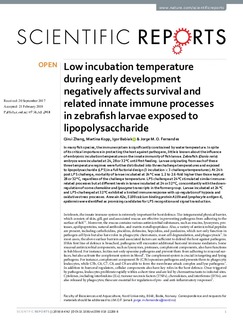Low incubation temperature during early development negatively affects survival and related innate immune processes in zebrafish larvae exposed to lipopolysaccharide
Journal article, Peer reviewed
Published version
Permanent lenke
http://hdl.handle.net/11250/2489881Utgivelsesdato
2018Metadata
Vis full innførselSamlinger
Originalversjon
Zhang, Q., Kopp, M. E. L., Babiak, I. & Fernandes, J. M. O. (2018). Low incubation temperature during early development negatively affects survival and related innate immune processes in zebrafish larvae exposed to lipopolysaccharide. Scientific Reports, 8: 4142. doi: 10.1038/s41598-018-22288-8Sammendrag
In many fish species, the immune system is significantly constrained by water temperature. In spite of its critical importance in protecting the host against pathogens, little is known about the influence of embryonic incubation temperature on the innate immunity of fish larvae. Zebrafish (Danio rerio) embryos were incubated at 24, 28 or 32 °C until first feeding. Larvae originating from each of these three temperature regimes were further distributed into three challenge temperatures and exposed to lipopolysaccharide (LPS) in a full factorial design (3 incubation × 3 challenge temperatures). At 24 h post LPS challenge, mortality of larvae incubated at 24 °C was 1.2 to 2.6-fold higher than those kept at 28 or 32 °C, regardless of the challenge temperature. LPS challenge at 24 °C stimulated similar immune-related processes but at different levels in larvae incubated at 24 or 32 °C, concomitantly with the down-regulation of some chemokine and lysozyme transcripts in the former group. Larvae incubated at 24 °C and LPS-challenged at 32 °C exhibited a limited immune response with up-regulation of hypoxia and oxidative stress processes. Annexin A2a, S100 calcium binding protein A10b and lymphocyte antigen-6, epidermis were identified as promising candidates for LPS recognition and signal transduction.

